In the last decade or so, as the big top Hollywood circus has seemingly consolidated itself around the tent poles of the scatological comedy and the superhero melodrama of teen-boy dreams, even the most talented leading ladies have to make do with slight, sexy tomboy parts or girl-next-door roles. It's slim pickings repeatedly demonstrating how down to hang and talk sports or make toilet jokes with the fellas they are, but also, oh wait, she is actually a fiery sex pot if and when we care to take notice. But, at only 26 years of age, Emma Stone has become one of the most singular and dynamic stars in movies by shaking the dust off of these traps and filling them with a magnetism and verve all her own.
In dude-heavy fare, from her first part in Superbad (2007) to the brain-eating comedy Zombieland (2009) and the basso profundo noir Gangster Squad (2013), Stone lights up her scenes with where-the-party-at ebullience. Interrupting the regularly scheduled bro fest, she arrives—all Catwoman eyes and loose limbs; so restless she seems to blur at her edges—like someone expecting to hear a punch line and ready to roar in appreciation. Playing Gwen Stacy, across from her real-life (former?) flame Andrew Garfield, in the most recent Amazing Spider-Man movies, Stone cuts through the noise and CGI, and the underwrittenness of her part, with a warmth that could power Electro. Playing, essentially, the Great Man's Daughter in last year's Macy's Thanksgiving Day Parade of outsize theatricality, Birdman, Stone provided much needed ballast with a candid, quick-focus performance—and was justly nominated for an Academy Award for her troubles.
When given a little more room to roam, as she was in the underrated coming-of-age comedy Easy A (2010) and in Woody Allen's Magic in the Moonlight (2014), or as part of a well-matched ensemble (2011's The Help and Crazy, Stupid, Love; and in what looks to be director Cameron Crowe's return to greatness, Aloha, out this month), Stone is still more winning. To see her live, whether hosting SNL or in a lip-synching contest with Jimmy Fallon on The Tonight Show, is perhaps to understand why. In real time, in front of real people, Stone's seemingly fearless appetite for the stage and unaffected embrace of the spotlight is utterly disarming. Where other "personalities" can seem to be playing themselves, Stone's presence lacks pretense altogether. Her gleeful ready-and-willingness doesn't come from desperation, doesn't plead for approval; her performances are infectious and affecting precisely because they so clearly communicate how much fun she is having in giving them.
As the Scottsdale native tells her hero, and the ultimate Woody Allen muse, Diane Keaton, that will to perform has always been with her, ever since she was a little girl being baked to death in the Arizona heat.
DIANE KEATON: So, Emma.
EMMA STONE: Yes ...
KEATON: I was on the cover of Interview magazine [January 1987] for this movie Crimes of the Heart [1986], with Sissy Spacek and Jessica Lange. And in that interview, I said, "The best way of getting something is not to let anyone know you want it—including yourself." Do you say things like that to yourself in order to just not feel guilty about being so successful and ambitious?
STONE: [laughs] Well, you know what? What's strange about the way my brain functions is that the only thing that has ever made me feel calm is knowing clearly what I want. You don't admit to yourself what you want?
KEATON: Well, I tried not to because I felt really guilty about wanting them.
STONE: Why?
KEATON: Because it just seemed like it was asking too much. And if I admitted that I wanted it, it would go away. It would be punishment, you know, for having the want.
STONE: I feel the opposite. Isn't that weird? But that just has to be some psychological mechanism that keeps you safe, somehow, in yourself. I feel safer when I know what I want. When I don't know what I want, I feel like I'm flailing through the universe. I need to get better at the not being clear about things.
KEATON: Well, maybe not. Maybe you're fine the way you are. Now, your 2012 cover photograph for Interview is startlingly sexy. You seem to stare out at the world unafraid. And you seem to be ready for everything an actress can play. Is that the way you feel?
STONE: God, no.
KEATON: Do you feel ready? Ready to take on these great roles?
STONE: I feel more ready than I ever have to do something incredibly different and challenging and scary. I think because I just played Sally Bowles [in the Broadway revival of Cabaret]. You know, because you started on Broadway, there's something about having to go up and do it every night, no matter how you're feeling, having to tell the whole arc of a story and not just scene by scene the way that you do on film. I feel more like I understand acting in a different way. It's totally different when you're shooting something. But only in the past six months to a year have I felt like I can really try these different things. I think I was really scared of that for a long time. And if something was really challenging, I thought that I was just going to fall on my face and embarrass myself. I'm just less scared of that now, of failing.
KEATON: Really the opposite of me. I can think of nothing worse than telling a story all the way through, to an audience of people alive before me, sitting in a theater. [Stone laughs] To me, the fragments are the most exciting.
STONE: Do you like to do a lot of takes?
KEATON: Oh, yeah. I like to just keep doing them because I never know what then's going to happen and I have the freedom to try things. And I just like the fragmented version of life. Telling a full story just seems too serious. The only thing that is interesting to me about performance is singing. Do you sing?
STONE: Well, I'm not a singer.
KEATON: See, that would be fun, the singing part.
STONE: Oh, it's a blast. But singing eight times a week, 40 songs total, is incredibly demanding. To live as a singer is incredibly demanding. I was losing my voice all the time.
KEATON: I want to go back to that photograph. You're so beautiful in it, and it tells me you are a chameleon. There are many yous in your photographs. I think that's a great thing to have, this ever changing appearance. In that interview, with Cameron Crowe, you said something that really resonated with me. You said that people become frozen in the time when they become successful because that's when their whole life experience kind of galvanized. They became successful for being that person at that time. And they really have to fight in order to grow past that. That's just a remarkable remark. What made you even think of that?
STONE: Did Cameron say that or did I say that? Well, jeez. Maybe I read it somewhere. [laughs] There's no way I came up with that, because I hadn't experienced that at that point. But now I've seen people that have been famous or successful for a very long time who can still get stuck in that. It's like they're staying at the age in which people ...
KEATON: Liked them the best.
STONE: Right. The universally accepted version of yourself.
KEATON: You can't do that, though. Even if you try.
STONE: You can speak to that much more than I can. You certainly haven't done that, and you've been well known for a very long time.
KEATON: Well, the fact that you've thought of it at age ... 23, 24?
STONE: I don't know if I thought of it. [laughs]
KEATON: It really struck me because I've been through that: How long are you going to hold on to what it was that made people drawn to you in the first place? And how do you change and move on with your life and have different experiences and grow and let it go?
STONE: Has that been challenging for you?
KEATON: In some ways. I was 30, I think, when Annie Hall [1977] happened for me. And that changed my life, completely, from that day forward. And so I had to take on those challenges. But for you ... I mean, you're a huge movie star, and you're only 26. It's just ridiculous, what you have to grapple with. Now, in that same interview, you also said that your first memory of pure happiness was sitting on the screened-in back porch with your dad during monsoon season in Arizona, eating circus peanuts and watching a storm. You were maybe 4 or 5. And to me this memory is something that's universal, mysterious yet simple.
STONE: Absolutely. The greatest thing about that memory—and I can only hope that other people have that same experience—is that it is of love before love ever got complicated. It is just the purest form of love that doesn't need to be explained. And if you're lucky enough to have had that with a parent, or with both of your parents, that's a life-changing feeling. So with all the things that have happened in my family or with friends or in love relationships over the years, to be able to go back to a memory where I'm just watching a monsoon and eating these circus peanuts, it's a touchstone kind of memory to have in your life.
KEATON: We're fortunate. I feel that same way, and particularly in things related to my family.
STONE: It's really special.
KEATON: You once said that your favorite thing about movies is the ending. And all your favorite movies have really great endings that you've loved. Can you tell me your favorite ending?
STONE: My favorite ending of all time is in City Lights [1931], the Charlie Chaplin movie. I just watch the ending of that movie alone on YouTube and cry. [laughs] I think any even mediocre movie can be saved by a great ending. And vice versa. A great movie with the wrong ending can just tank the whole thing. So in City Lights, Chaplin is the Tramp. He's in love with this blind flower girl who sells flowers on the street. And one day he buys a flower from her and she hears a door slam. She thinks that he's left and that he's left her with all of this change. She begins to believe that he's this rich man and he kind of, you know, keeps this alive. She thinks he's a millionaire. But he's the tramp and has no money. So one day he reads in the paper that there's a doctor doing eye surgery. And I think it's $5,000 for the surgery. He enters this boxing competition and he leaves her this money to get her eye surgery. And she doesn't know who he truly is. And so in the end, in the last five minutes, he's walking down the street and he hasn't seen her for months. A bunch of kids are spitting spitballs at him and making fun of him. And she comes out. He sees her in a window. She owns a flower shop now. And she comes out of the store and she pins a little flower on his lapel and she feels his hand. And she knows his hand because she was blind before. And she's just feeling his hand and looking at him because he looks so different than I'm sure she thought he would look. And he is staring at her in this way that you've just never seen—someone with so much love in their eyes. And she says, "You?" And he nods. And he says, "You can see now?" And she says, "Yes, I can see now." And he smiles, and then it just fades out. It's the most beautiful thing. I think Woody loves that movie too.
KEATON: Oh, he does.
STONE: The end of Manhattan [1979] feels like that ending.
KEATON: How old were you when you first saw that movie?
STONE: I think I was 14. Actually, there was someone in my life at that time who was watching these movies in school. And so he showed me Charlie Chaplin.
KEATON: Ah.
STONE: That was one of those relationships in my life where the relationship itself did not work out very well. But, God, the things he introduced me to in pop culture were invaluable and kind of shaped my life. So I'm grateful to him for that.
KEATON: Andrew Garfield said, "Working with Emma was like diving into a thrilling, twisting river [Stone laughs] and never holding on to the sides. From the start. To the end. Spontaneous. In the moment. Present. Terrifying. Vital. The only way acting with someone should be." My God. I mean, what did you feel when you heard such a dream-come-true observation?
STONE: He is such a poet. [laughs] But that's the way he writes in general. So I hear it and of course my heart swells up. And I also know that he writes things like that on a daily basis. [laughs]
KEATON: No way.
STONE: Yes, he does. He's so poetic.
KEATON: What a guy. But that's beautiful.
STONE: What a guy. He is a real Wordsworth. [both laugh]
KEATON: Good for you. Good for him.
STONE: Good for him. [laughs]
KEATON: So, Emma, look. The way I see it is, you're unconventionally beautiful.
STONE: Ooh.
KEATON: And I consider things like complexity and a certain kind of off-kilter aspect to a person as important components of beauty. But when you think of beauty, how do you define it?
STONE: Our tastes are pretty similar. Based on your book and what I've seen on your Pinterest board. [laughs]
KEATON: Oh my God.
STONE: The more unique the better. When you feel that a person is being true to how they want to look or what their face is, I think there's something about the acceptance of oneself that I can feel from people. That tends to be what I'm attracted to.
KEATON: And I think that that would fit with this. I know about you; I read about you on Wikipedia. You were born in Scottsdale, Arizona.
STONE: Yup.
KEATON: And of course you love your mother deeply. So I thought, "Well, we do have that in common: the West and our mothers." Yet, I think that your story is very different. Because in Wikipedia it says that you lived on the grounds of the Camelback golf course.
STONE: This is why we can't trust Wikipedia.
KEATON: It's not true?
STONE: We did live on the 16th hole of the Camelback golf course. But it once said on Wikipedia that my parents owned the golf course, which could not be further from the truth. But if you're in Arizona, you're at least within a couple miles of, if not on, a golf course.
KEATON: I also read that you were home-schooled for two years.
STONE: That's true.
KEATON: At which time, listen to this, this cracked me up, you appeared in 16 productions at the Valley Youth Theatre, including Alice in Wonderland and The Princess and the Pea. [Stone laughs] I've just been going, "Wow, this girl!" Now listen, really, Emma, come on, how on earth did you develop such passion? And really, how did you have this strong work ethic in those early years on the golf course or wherever the hell you were being home-schooled? Appearing in 16 productions! This is some story. Even then, you knew.
STONE: I definitely did know that I really liked to perform. That was definitely clear to me. While taking my correspondence courses at home, I was absolutely obsessed, and I remain pretty obsessed to this day, though hopefully in a more grown-up way.
KEATON: So when your dream came true and you became this big movie star actress, did you feel a kind of responsibility to the people who gave you your stardom in a way, like your fans? I mean, what is your relationship to your fans?
STONE: I don't feel any different from anyone. I am such a diehard fan—as you of all people should know. [laughs] I know what it is to be a fan. But I don't think I've ever really considered the idea of having fans. I think I'm always sort of ducking that, thinking it's more about the work, the project itself, than me, in particular, that's speaking to people. So I've never really taken it all that personally, as if it has something to do with me. Maybe that's unwise. But when someone comes up to you and says something truly heartfelt about work you've done, that means a lot.
KEATON: Your story captures me. The setting as well. [both laugh] It's so great. It's so really perfect for me. The heat and the dryness of the air.
STONE: Do you love the desert?
KEATON: Ugh, I love it.
STONE: See, I struggle with the desert. Having grown up in Arizona, I struggle with the dryness. I love the heat but I don't like the dryness. And I've only recently realized that I love the heat. Because at the time I thought heat and dryness went hand-in-hand. And now humidity and heat, oh God, I love it.
KEATON: You like the East Coast summer?
STONE: Oh, I love it because you feel alive. You don't feel like you're being baked alive. You're sweating and your hair looks terrible and you're just ... Like in New Orleans, it's a sexy heat. Whereas in Arizona it's heat with a murderous intent. [Keaton laughs] Like, why would anyone settle here kind of heat. But there's nothing like the sunsets. And there's nothing like the kind of peace that you get in the middle of the desert too. I think I should give it another chance now.
DIANE KEATON IS AN AWARD-WINNING ACTRESS WHO HAS STARRED IN THE FILMS ANNIE HALL, MANHATTAN, THE FIRST WIVES CLUB, AND SOMETHING'S GOTTA GIVE, AMONG OTHERS. SHE CAN CURRENTLY BE SEEN IN FIVE FLIGHTS UP.
Source

.jpg)
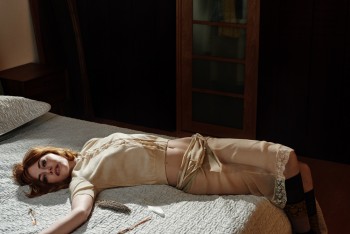
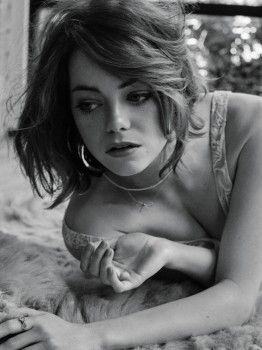
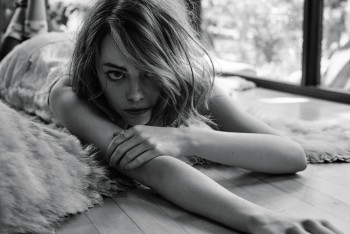
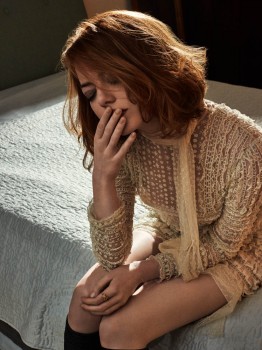


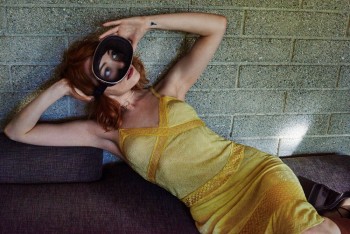
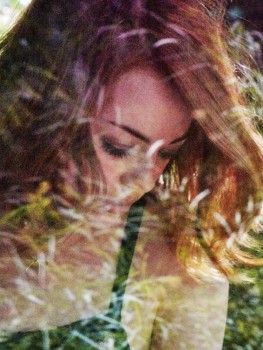


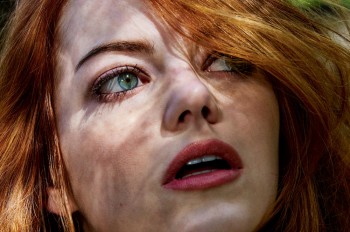

No comments:
Post a Comment